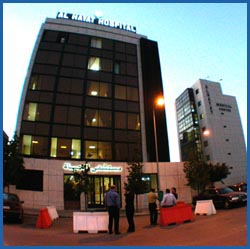 March 2008 (IRIN) , According to a December 2007 report by the Lebanon government in conjunction with the World Health Organization, of the over 1,500 beds in some 15 state hospitals, just 300 are functioning. By comparison, Lebanon has 175 private hospitals with around 14,500 functioning beds. They are generally considered to have more modern facilities and provide a higher standard of healthcare.
March 2008 (IRIN) , According to a December 2007 report by the Lebanon government in conjunction with the World Health Organization, of the over 1,500 beds in some 15 state hospitals, just 300 are functioning. By comparison, Lebanon has 175 private hospitals with around 14,500 functioning beds. They are generally considered to have more modern facilities and provide a higher standard of healthcare.
Abed Akkawi and Salah Eddine Azawi talk about their experiences of Lebanon
| Then they said Wafa didn’t need any treatment and discharged her from the hospital. So I took her to the Sahel hospital in Ghobyri in the southern suburbs. They repeated all the same scans and then said she needed surgery. But they required a deposit of $1,500. I managed to collect $630 from friends and the doctors did the surgery.
“But because I couldn’t pay the full bill they wouldn’t let my wife leave the hospital. I offered to work for them for free but they did not accept. They kept her for three days and put pressure on me for the money. Each extra day in hospital cost hundreds of dollars more. “Eventually I told the authorities I had divorced my wife because I knew that was the only way they would stop coming after me. The hospital let Wafa go and she moved back to Syria and divorced me. I still owe people money from this incident.”
Second case study Wamid al-Kazem was a 32-year-old Iraqi asylum-seeker in Lebanon whom friends say slipped into a coma suddenly in his sleep in 2005. His friend, Salah Eddine Azawi, recounts the difficulties faced trying to get treatment for Wamid. “Wamid never wanted to go back to Iraq. He had a good laundry business going here and he was a healthy guy. I never knew him to suffer any health problems. We chatted late one night last summer and I remember hearing him snoring, but in the morning Wamid had gone into a coma. “Neither of us had health insurance because for that you need a bank account and as Iraqis in Lebanon are not legal residents we cannot have a bank account. We took him straight to Bahman hospital in Hart Hreik [in Beirut’s Hezbollah-controlled southern suburbs] which is owned by [Shia religious leader] Mohammed Hussein Fadlallah. “Wamid had some money saved up, about US$1,300, which we paid on the first day he went to hospital. His friends gathered all we had, which was about $2,700 to pay for him to be on a life support machine. It was very expensive. We asked Fadlallah’s people if we could get some financial support from them and they gave us a 20 percent discount on the cost. “Wamid’s brother came from Iraq to Lebanon but did not arrive for nearly two months. Wamid was on life support for around 60 days, which cost $25,000. We had no way of paying this, even with the 20 percent discount, so we approached the Christian Maronite Church in Beirut’s Hamra neighbourhood to ask for support. They paid the whole remaining bill of $16,000 and arranged an ambulance to transport Wamid and his brother back to Baghdad. “On the second day after he arrived back in Iraq Wamid died.” hm/ed/cb |
||
| [ENDS] |





